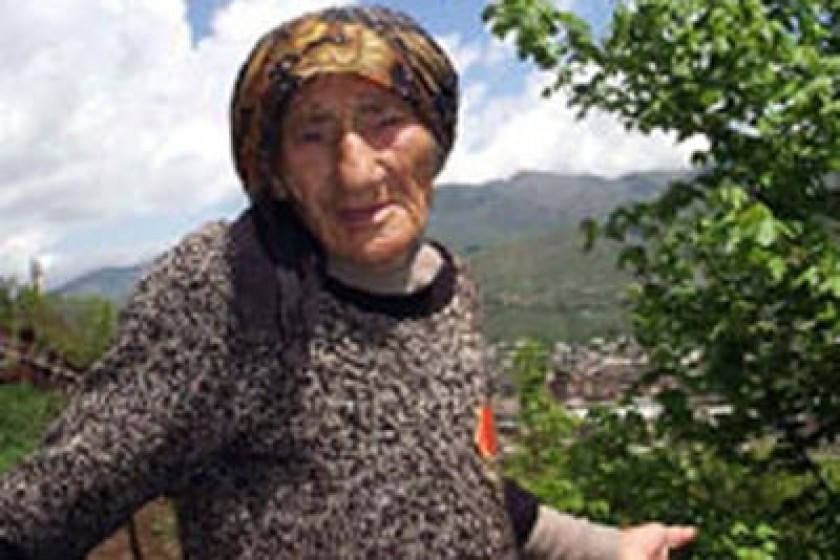
Should I Eat the Medal?
Eighty-seven year old Ashkhen Hakobjanyan was not particularly overjoyed by the medal she was given on the 60 th anniversary of VE Day. That kind of attention from the state does little to help the abandoned woman put food on her table.
"I went to the city municipality and told them I had a bag of medals. If it were food I'd eat it. What did you give the metal to me for?" Grandmother Ashkhen complained. For her, medals and certificates from World War II are only unwelcome reminders of the past.
"I was 23 when the war started. At that time, my husband and I lived in Alaverdi. We were all taken to Kirovakan, then I stayed there but my husband was taken to the front," Ashkhen recollected.
As a young woman, she served behind the frontlines in Tbilisi and Baku, helping to transport the wounded to the hospital, and keeping cows and working in the canteen as well.
"There were so many soldiers we never stopped cooking," she said. "At night they would bring the supplies by car, we'd go and unload the wagons like men. We were each given 300 grams of bread but we felt sorry for the soldiers and gave our bread to them."
Victory brought no peace to Ashken, now a mother of three. Her husband had been taken prisoner, and for five years she had to bring up her children alone. He was freed in 1950,and the couple built a house in Vanadzor and had three more children.
Though she raised three sons and three daughters, Ashken is spending the final years of her life alone. Her children have all gone their own way, and her husband died two years ago. She gave half of her house to one of her sons and lives on her own in the other half, which will go to another son when she dies.
"I've worked since I was 16," Grandmother Ashkhen said proudly. She worked the longest at the Vanadzor Chemical Plant. Since she retired, instead of enjoying a well-earned rest, she has been farming the plot of land next to her house.
"I grow potatoes, beans and herbs. I have apple, plum, and cherry trees, I grow grapes and make wine. From time to time, I go to my parents' village and work on the land there, pick potatoes with my relatives. They each give something in return and I live on that," she explained, ashamed of her poverty. She cooks once every four days, one loaf of bread lasts her as long. When she has to, she goes to the store and buys bread, sugar, coffee, and oil on credit.
"At night I take sips of water so I don't get hungry. In winter, I get warm at different people's houses, and at night I take a hot-water bottle to bed with me.
The eighty-seven year old is known for being hard-working. This year, she has managed to go to the forest three times to gather herbs and mushrooms, which she gives to people she knows in exchange for food or money in return. When she has picked all the potatoes in her own field, she takes her spade hires herself out top her neighbors. Sometime she cuts the grass with a scythe, and sells it for a few drams.
But her health is not what it used to be. "I have high blood pressure, sometimes my head spins and everything goes back in front of my eyes. My legs hurt," she says showing us her aching knee. She says she can't go to the doctor, because they ask for too much money.
She won't go to a nursing home, unwilling to dishonor her three children who are still living. "It's a shame; what will people think? I'm not sick or anything and I've still got hands and feet, I do everything and I'll keep on going," she said. She uses the 7,00 dram pension and the 2,500 drams in benefits (about $20 in total) that she receives from the state to pay her debts at the store and her gas and electricity bills. She often gives money to her grandchildren who live the other half of the house; her conscience doesn't let her do otherwise, even though she lives completely on her own.
 Videos
Videos Photos
Photos
Write a comment